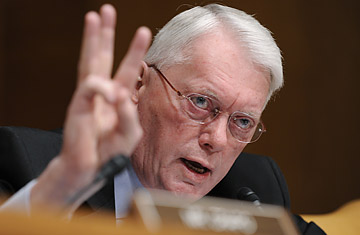
Senate Budget Committee member Sen. Jim Bunning, R-Ky. asks a question of Federal Reserve Chairman Ben Bernanke, not shown, during his testimony before the committee, Tuesday, March 3, 2009, on Capitol Hill in Washington.
(2 of 2)
Kentuckians have come to expect outrageous statements from Bunning. When the Ohio River flooded parts of Louisville in 1997, Bunning, then a state representatitve from Northern Kentucky, blamed the devastation on the city's failure to raise its flood walls, only to have to apologize when the storm-weary city leaders pointed out that the walls had been up for days. In 2004, he claimed, without any support, that an opponent's staffer had beaten his wife and he at a political event; during that same campaign he reminded voters he had run before with George Bush on the ticket, and would win again with him on it, despite the fact that Bush had been governor of Texas in 1998. Most recently he practically predicted the imminent death of Supreme Court Justice Ruth Bader Ginsburg, who is being treated for pancreatic cancer, though he subsequently apologized. (See the screwups of Campaign '08.)
But the heated rhetoric he has used in recent weeks towards his own party has shocked some of his longtime observers. Just last week, Bunning reportedly told party donors that if the party kept pressuring him, he would simply quit and allow the Democratic governor of Kentucky to appoint his replacement. He has since denied the claims, and did so to TIME again this week through a spokesman. But the Louisville Courier-Journal, the state's leading newspaper, has stuck with its story, citing three sources who say they heard Bunning make the threat.
Given the GOP's precarious position, it's a threat that not even McConnell can afford to take lightly, and the war may be entering a truce. Few figures in the state have publicly taken sides, and Williams has been silent about his intentions. But the prospect of war between Bunning's camp and McConnell's has kept party activists in Kentucky fretting. "Everyone is focused on winning," said Republican strategist Scott Jennings of Louisville, a member of the state party's executive committee and a former Bush White House aide. "No one doubts Jim Bunning's conservative positions, or that he has been a staunch conservative voice in the Senate. But Republicans are looking at the tactics and the machinery needed to run and win a campaign in 2010, and that's where the questions are." (See pictures from the Republican National Convention.)
In fact, Bunning's reliably — and defiantly — conservative voting record is largely in tune with Kentucky's reddest voters, the same folks who will decide the primary in 2010. His fervent opposition to the bank bailout increasingly looks smart, at least in the minds of many in Kentucky who are unimpressed with the economic recovery plans. Strongly against abortion and gay marriage, Bunning was rated last year as the third most conservative senator by the National Journal.
Fresh on the minds of Kentucky Republicans, and probably McConnell, too, is the race McConnell just won. He spent $20 million, three times the record-setting $6 million Bunning raised in 2004, and by the time the votes were counted found himself more than $2 million in debt. There's no reason to suspect that a race in 2010 will be any cheaper, Jennings said. With Democrats in power in Washington, competitive candidates like Mongiardo can expect a torrent of money, while Bunning's campaign war chest is lacking. With less than $200,000 raised for the 2010 race, even Bunning's supporters are concerned, according to Jennings. Experts say Bunning could still raise enough money; since McConnell's famed money machine was working overtime for his own campaign, and the party also just endured a bruising (and losing) 2007 campaign to re-elect former Gov. Ernie Fletcher, it's no surprise that Bunning hasn't been able to raise much yet.
McConnell and Bunning will come together this Saturday for another Lincoln Day dinner in Corbin, a hard-scrabble town in the eastern Kentucky mountains. They are likely to play nice, but McConnell may still see a man who can't win in 2010. If so, Bunning will make sure it's a problem that belongs to McConnell as much as it does to himself.
